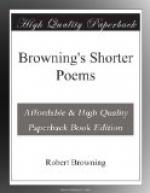THE LOST LEADER. (PAGE 75.)
The desertion of the liberal cause by Wordsworth, Southey, and others, is the germinal idea of this poem. But Browning always strenuously insisted that the resemblance went no further; that The Lost Leader is no true portrait of Wordsworth, though he became poet-laureate. The Lost Leader is a purely ideal conception, developed by the process of idealization from an individual who serves as a “lay figure.”
13. =Shakespeare= was more of an aristocrat, surely, than a democrat. Milton had championed the cause of liberty in prose and poetry, and had worked for it as Cromwell’s Latin secretary.
14. =Burns, Shelley=. What poems can you cite of either poet to place him in this list?
Who is the speaker? What is the cause? Why does he not wish the “lost leader” to return? How does he judge him? What does he expect for his cause? What does he mean by lines 29-30? lines 31-32? Point out the climax in the second stanza.
APPARENT FAILURE. (PAGE 77.)
3. =your Prince=. Son of Napoleon III., born in March, 1856.
7. =The Congress= assembled to discuss Italy’s unity and freedom. =Gortschakoff= represented Russia; =Count Cavour=, Italy; =Buol=, Austria. Austria had conquered Italy. See Browning’s The Italian in England.
12. =Petrarch’s Vaucluse=. The fountain from which the Sorgue rises. The town of Vaucluse (Valclusa) was the home of the poet Petrarch (1304-1374).
14. =debt=. The obligation to visit a famous place.
39. =Tuileries=. The imperial palace in Paris.
43-44. What is meant? Death? Freedom?
46-47. In allusion to the game of rouge-et-noir. Criticise the taste shown here.
In what sense does the poet intend to “save” the building? Describe the scene that he recalls. What three types are the suicides? How does the poet know? Why does he deny the failure of their lives? Does he base his optimistic hope on reason or feeling? Note the climax in line’s 55-57. State in your own words the meaning of the last six lines.
FEARS AND SCRUPLES. (PAGE 80.)
The problem of the religions doubter is here set forth by an analogy.
5. =letters=. The reference is of course to the Scriptures.
17 ff. In reference to sceptical criticism.
What are the “fears and scruples” held by the speaker? What proof does he desire to allay his doubts? Does he settle the doubt or put it aside? Where is his spirit of reverence best shown?
INSTANS TYRANNUS. (PAGE 82.)
="Instans Tyrannus"=, the threatening tyrant. The phrase is from Horace’s Odes, Book III., iii., as is probably the idea of the poem. Gladstone translates the passage:—




